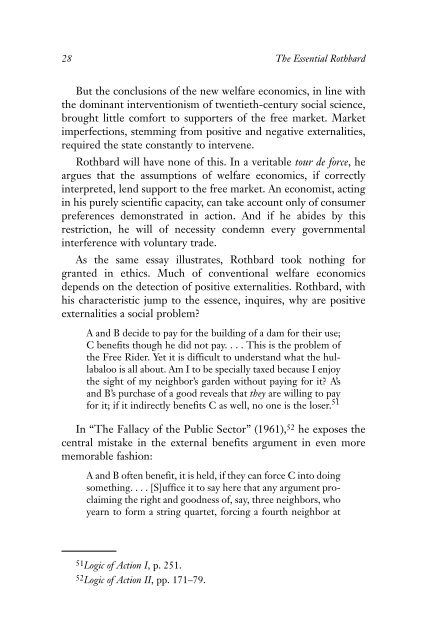The Essential Rothbard - Ludwig von Mises Institute
The Essential Rothbard - Ludwig von Mises Institute
The Essential Rothbard - Ludwig von Mises Institute
Create successful ePaper yourself
Turn your PDF publications into a flip-book with our unique Google optimized e-Paper software.
28 <strong>The</strong> <strong>Essential</strong> <strong>Rothbard</strong><br />
But the conclusions of the new welfare economics, in line with<br />
the dominant interventionism of twentieth-century social science,<br />
brought little comfort to supporters of the free market. Market<br />
imperfections, stemming from positive and negative externalities,<br />
required the state constantly to intervene.<br />
<strong>Rothbard</strong> will have none of this. In a veritable tour de force, he<br />
argues that the assumptions of welfare economics, if correctly<br />
interpreted, lend support to the free market. An economist, acting<br />
in his purely scientific capacity, can take account only of consumer<br />
preferences demonstrated in action. And if he abides by this<br />
restriction, he will of necessity condemn every governmental<br />
interference with voluntary trade.<br />
As the same essay illustrates, <strong>Rothbard</strong> took nothing for<br />
granted in ethics. Much of conventional welfare economics<br />
depends on the detection of positive externalities. <strong>Rothbard</strong>, with<br />
his characteristic jump to the essence, inquires, why are positive<br />
externalities a social problem?<br />
A and B decide to pay for the building of a dam for their use;<br />
C benefits though he did not pay. . . . This is the problem of<br />
the Free Rider. Yet it is difficult to understand what the hullabaloo<br />
is all about. Am I to be specially taxed because I enjoy<br />
the sight of my neighbor’s garden without paying for it? A’s<br />
and B’s purchase of a good reveals that they are willing to pay<br />
for it; if it indirectly benefits C as well, no one is the loser. 51<br />
In “<strong>The</strong> Fallacy of the Public Sector” (1961), 52 he exposes the<br />
central mistake in the external benefits argument in even more<br />
memorable fashion:<br />
A and B often benefit, it is held, if they can force C into doing<br />
something. . . . [S]uffice it to say here that any argument proclaiming<br />
the right and goodness of, say, three neighbors, who<br />
yearn to form a string quartet, forcing a fourth neighbor at<br />
51 Logic of Action I, p. 251.<br />
52 Logic of Action II, pp. 171–79.

















